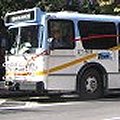- By Patty Poist
- Around Town
 Print
Print  TCAT Interim Maintenance Manager Jim Caco and his team this week installed state-of-the-art seats, manufactured by Michigan-based American Seating Co., for riders to test out and give their feedback. The seats will be on the bus, a 2011 Gillig, for passenger testing about six weeks, Caco said.
TCAT Interim Maintenance Manager Jim Caco and his team this week installed state-of-the-art seats, manufactured by Michigan-based American Seating Co., for riders to test out and give their feedback. The seats will be on the bus, a 2011 Gillig, for passenger testing about six weeks, Caco said.All TCAT buses, including No. 1118, are rotated into service among many of TCAT's 33 routes so he hopes many riders, using urban, campus and rural routes, will have the opportunity to "take a seat" on the test seats and voice their opinions. Passengers can provide feedback by emailing TCAT at This email address is being protected from spambots. You need JavaScript enabled to view it. or call and leave a message at (607) 277-9388, ext. 560.
Caco said the demo seats are durable, sleeker and lighter, and will be easier to clean than the heavier-framed cushioned seats now installed on TCAT's fleet of more than 50 buses. Both set of the demo seats are made fiberglass and ABS (Acrylonitrile butadiene styrene) plastic, which is very durable and impact resistant. One set of the demo seats is without fabric and the other set is covered with a light antimicrobial, liquid-resistant fabric that is extremely resilient to wear and tear, Caco said.
If a passenger gets sick or a seat is otherwise soiled, buses with the heavier-framed cushioned seating must be taken out of service and professionally cleaned and dried, which takes several hours, Caco said. That process puts a strain on service, especially during rush hour when the majority of the fleet is needed to fulfill service, he said.
 TCAT Interim Maintenance Manager Jim Caco tests out new seats
TCAT Interim Maintenance Manager Jim Caco tests out new seats TCAT Interim Maintenance Manager Jim Caco tests out new seats
TCAT Interim Maintenance Manager Jim Caco tests out new seats"In some cases, these incidents have caused missed trips and major inconvenience to our passengers," Caco said. "These state-of-the-art seats can be cleaned and put back on the road very quickly. We will also cut down on costs as we won't have to use a professional cleaning service as frequently."
Another plus, Caco said, the seats weigh less than the current seating, which will make the buses lighter, easier to accelerate and will cut down on fuel costs. "It would be like noticing that your car is lagging, the gas in your tank is being depleted at a faster rate and then remembering that you have a 100-pound bag of dog food in your trunk."
Caco said the demo seats are ergonomically designed and provide better back support and more leg room than the current seating. In addition, they take up less space so there is more aisle space. "They provide much more comfort than our current seating, more personal space and more hip-to-knee room," Caco said.
If TCAT decides to go with the new seating, they would be installed 'by attrition' in any new buses TCAT purchases in the future. At present, TCAT is about to order 10 new buses, which take up to 18 months to manufacture. Caco added that if TCAT opts for the seating, the agency could also consider adding USB ports on the backs of the seats so passengers will be able to charge their cell phones, laptops and other mobile devices.
v12i32



